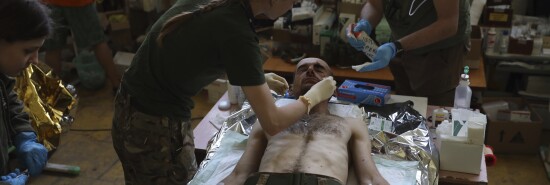
Russia is now acting from sheer, wanton cruelty
Dan Hannan
Video Embed
A year ago, I experienced a moment of heart-stopping beauty in the middle of a war. It happened in the House of Scientists in Odesa, built as a stately home by the Tolstoy family in the early 19th century. I had visited many more famous palaces, but few lovelier ones. The rooms were perfectly proportioned, and the colors harmoniously blended, but it was the textures that moved me the most. Gilded mirrors, inlaid walnut, silk upholstery, gleaming chandeliers, a parquet floor made with 22 varieties of oak — all these surfaces gleaming, as in some Dutch Golden Age painting, with truer-than-life intensity. In one room, a music professor was playing Chopin on a grand piano that had belonged to Franz Liszt, and I felt tears pricking at my eyes. If my Ukrainian hosts were aiming to show me what they were fighting for, they succeeded.
In July, that marvel of classical architecture was pummeled by Russian missiles. It was not the only piece of local heritage targeted. Odesa’s cathedral was also hit, as were several homes. When I learned what had happened, a line from Shakespeare’s Henry V came into my head: “I was not angry since I came to France until this instant.”
Then, I felt slightly ashamed. How could the demolition of a building, however exquisite, have upset me when so many civilians had been bombed? I was on the Ukrainian border when the refugees poured over it at the beginning of the conflict, driving them to reception centers. I had visited Kyiv and heard appalling stories of loss and sacrifice. Why was I so affected by the loss of a palace?
I had felt a similar pang when the Islamic State smashed the temple in Palmyra. It was hardly the worst abomination of the Kharijite terrorists, who had tortured children, murdered aid workers, and burned captives alive. Yet there was something peculiarly shocking about it.
Perhaps it has to do with sheer wantonness. Like the razing of Palmyra, the flattening of Ukraine’s architectural heritage serves no strategic purpose. There is no military justification for hitting Odesa at all, let alone its UNESCO-designated center. No, this is cruelty for its own sake.
Such crimes, we may be sure, will be long remembered. To this day, we recall the difference between the way the retreating Nazis treated Paris and the way they treated Warsaw.
Hitler decreed that “Paris must not pass into the enemy’s hands except as a field of ruins.” But his commander on the spot, Dietrich von Choltitz, refused the order, instead surrendering a largely intact city.
In Warsaw, by contrast, Hans Frank, who commanded the German government of occupation, did as he was bid, ordering the “complete annihilation” of the city. Warsaw’s buildings were numbered in order of cultural importance and systematically dynamited.
What makes Russian President Vladimir Putin’s attack on Odesa especially hideous is that, by his own logic, it is a Russian city. It was built by Catherine the Great and is overwhelmingly peopled by Russian speakers who, until very recently, voted for candidates who favored a closer association with their eastern neighbor. Not anymore. Local people loathe Russia with the peculiar intensity of a betrayed friend.
It is easy, after more than 500 days, to experience a measure of war fatigue. The Ukrainian flags hoisted around the Western world in February last year have become such familiar sights that we barely register seeing them anymore. Some politicians, tiring of the whole business, suggest we have done all we can, or that there are abuses on both sides (which is true of all wars but has no bearing on who is in the right), or that all that matters is getting energy and food supplies flowing.
But the two sides are not equivalent, either in their motives or their methods. Russia launched an unprovoked attack on a neighbor that offered it no threat. The war has been waged on Ukrainian territory. The civilian casualties have been Ukrainian. One side is fighting for conquest, the other for survival.
What business is it of ours? Well, in 1994, Ukraine surrendered its nuclear weapons in exchange for a binding promise that its sovereignty would be respected within its existing borders. Who guaranteed that accord? Britain, America, and (this cannot be repeated too often) Russia. Russia’s invasion in defiance of that pledge was an unspeakable betrayal and left the other two guarantors with no choice but to support the wronged party. Of course, we all want peace. But the shortest path to peace is a Russian defeat.
